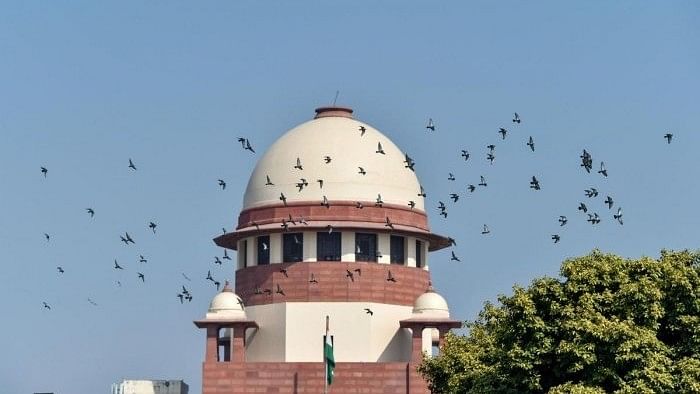
A view of the SC.
Credit: PTI Photo
New Delhi: The Supreme Court on Friday said that judges should avoid to "preach and express personal views" in dealing with cases as it found the Calcutta High Court's suggestions that every female adolescent should "control sexual urge/urges" and "protect her right to integrity of her body" as prima facie "highly objectionable, completely unwarranted and in violation of Article 21 of the Constitution".
A bench of Justices Abhay S Oka and Pankaj Mithal issued notice to the West Bengal government and others in a suo motu case registered as 'In Re: Right to Privacy of Adolescent' arising out of the High Court's judgment of October 18, 2023.
The judgment was pronounced in a case related to kidnapping for the purpose of marriage and other offences under the Protection of Children from Sexual Offences Act.
The bench said that there was absolutely no reasonings given by the High Court in its order acquitting the accused.
The court fixed the matter for consideration on January 4, 2024.
The apex court particularly took an objection to the paragraph 30.3 of the HC's judgment which stated: "It is the duty/obligation of every female adolescent to protect her right to integrity of her body; protect her dignity and self-worth; thrive for overall development of her self transcending gender barriers; control sexual urge/urges as in the eyes of the society she is the loser when she gives in to enjoy the sexual pleasure of hardly two minutes; protect her right to autonomy of her body and her privacy".
For male adolescents, the HC bench had said that they should "respect the duties of a young girl or woman and he should train his mind to respect a woman, her self worth, her dignity and privacy, and right to autonomy of her body".
The top court said, "Prima facie, we are of the view that, the judges are not expected to express their personal views or preach."
It also said that the observations made by the Calcutta High Court are "highly objectionable and completely unwarranted".
"The said observations are completely in violation of the rights of adolescents under Article 21 of the Constitution," it said.
The court appointed senior advocate Madhavi Divan as amicus curiae to assist it.
The court also asked the West Bengal counsel Astha Sharma to take a view on filing an appeal in the matter since the High Court's order of acquittal was "bereft of any reasonings".
On October 18, 2023, a division bench of the Calcutta High Court suggested that every female adolescent should "control sexual urge/urges" and "protect her right to integrity of her body".
The court had then set aside the conviction of a man, who married the minor girl and became a father of a girl, stating that this was a case of "non-exploitative consensual sexual relationship between two consenting adolescents though consent in view of the age of the victim is immaterial".
The bench had referred to the unintended consequence of the POCSO Act, and called for a balanced approach between protecting children and avoiding the criminalisation of consensual acts among adolescents above 16 years.
"We, therefore, do not propose to suggest to tinker with the age of consent in the POCSO Act. We leave it to the Law Commission of India and National Commission for Protection of Child Rights (NCPCR) to deliberate on this aspect to give their suggestions to the appropriate government," the bench had said.
"So far as the case of criminalisation of romantic relationship between two adolescents of opposite sex is concerned, it should better be left to the wisdom of the judiciary. Each judiciary in the world has the nicety of pluralism. Each individual judge has his/her own opinion. He/She has his/her own unique style of addressing an issue," the bench had added.
The High Court had also highlighted the need for parental guidance for adolescents and requisite sex education with emphasis on these aspects and reproductive health and hygiene should be a part of the curriculum of every school.
"We do not want our adolescents to do anything that will push them from the dark to darker side of life. It is normal for each adolescent to seek the company of the opposite sex but it is not normal for them to engage in sex devoid of any commitment and dedication," the bench had said.
